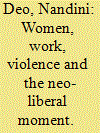| Srl | Item |
| 1 |
ID:
096309


|
|
|
|
|
| Publication |
2010.
|
| Summary/Abstract |
One attraction of "choice" feminism has been its refusal to judge the diverse desires of women. Yet for feminism to retain its political vision as a quest for social justice, we must continue difficult conversations concerning how acting on our individual desires impacts the lives of others. In this essay, I argue that feminists can acknowledge women's diverse desires while forging a meaningful feminist community. I make this argument by considering feminism's relationship to time, and particularly how women's diverse desires are read in each moment in time. If we abandon the generational model, wherein each new generation of feminists improves upon the last, for a genealogical perspective where women recognize our feminist origins and empathize with the diverse struggles of other women, we might reaffirm social justice for the community as central to feminist politics. To articulate this possibility, I turn to the work of Simone de Beauvoir to explain her discovery of how her embodiment as a woman and her relationship to femininity becomes a way of grounding a feminist politics. Recognizing the "demands of femininity" in other women's lives allows us to affirm feminist community while retaining the capacity to make judgments that realize social justice as a feminist goal.
|
|
|
|
|
|
|
|
|
|
|
|
|
|
|
|
| 2 |
ID:
151101


|
|
|
|
|
| Summary/Abstract |
Women representation in decision-making and law-making is considered as
a vital step in women empowerment. The Martial Law regime of General
Pervez Musharraf1
brought in a drastic change in the composition of Pakistani
legislatures at both central and provincial levels and has increased 17 per cent
of reserved seats for women in 2002. However, this was much less than
the 33 per cent stated in Strategic Objective G-2 in the plan. This step was
deemed as a landmark in materialising the long-cherished dream of empowering
Pakistani women. The purpose of this study is to assess the discourse
on women’s political empowerment and their level of participation in mainstream
politics by analysing the gender gaps in the Election Laws—General
Elections of 2002, 2008 and 2013. Women are now present in all the legislative
assemblies of Pakistan from more than a decade. How far this change
has remained useful in addressing and solving the problems faced by Pakistani
women? Furthermore, how these women legislators have performed on specific
women-related issues or is this step just an extension of strengthening the
dominant families in Pakistani politics? The issue of quota discourses in the
Parliament is also discussed.
|
|
|
|
|
|
|
|
|
|
|
|
|
|
|
|
| 3 |
ID:
108921


|
|
|
|
|
| Publication |
2011.
|
| Summary/Abstract |
One of the surprising effects of neo-liberalism has been to shift progressive politics away from labour organizing towards NGO-led campaigns against social harms. Reading labour histories and feminist histories together, it is argued that the new politics of resistance needs a new language which combines broad feminist analysis with grassroots labour organizing strategies.
|
|
|
|
|
|
|
|
|
|
|
|
|
|
|
|